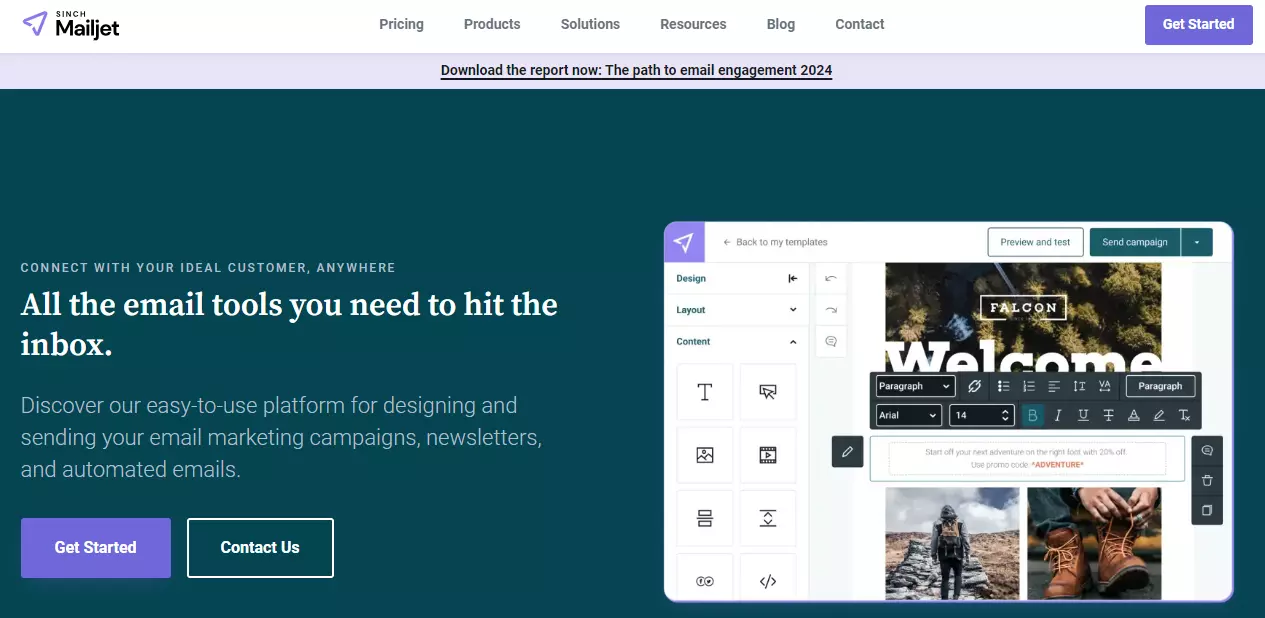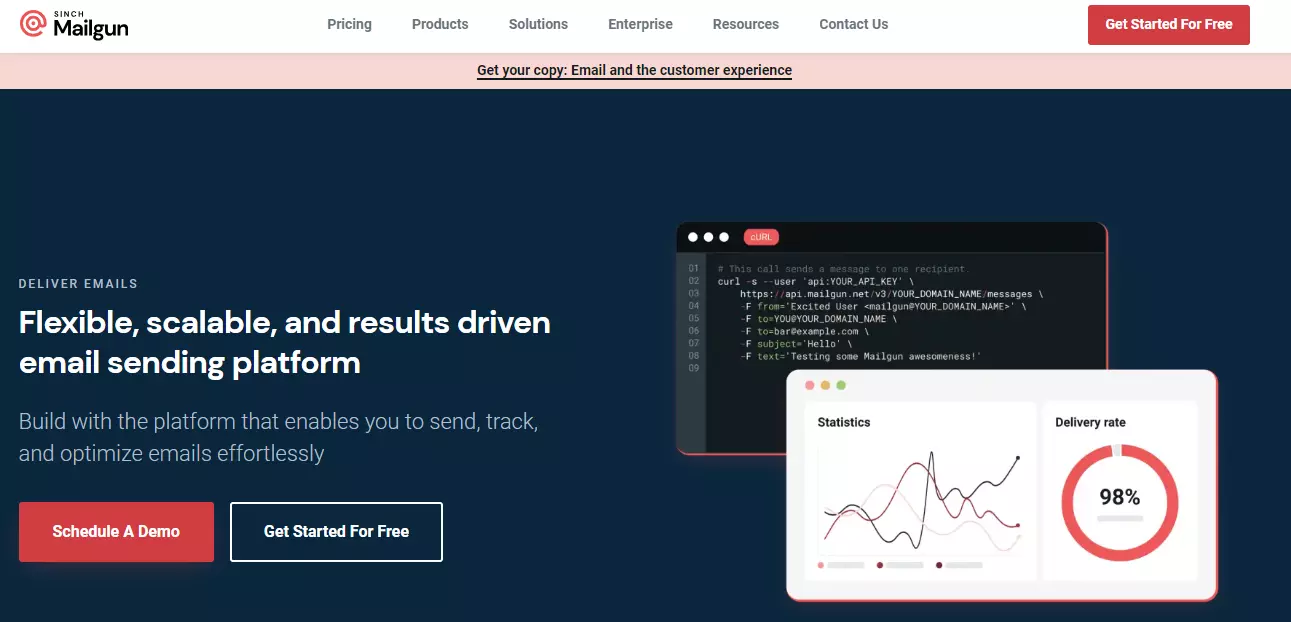
Mailjet and Mailgun are cloud-based email service providers that offer APIs for sending, receiving, and tracking emails.
Both offer robust features and reliable service, but they cater to different needs and preferences.
In this blog post, we'll compare Mailjet and Mailgun to help you decide which one is the right choice for your email needs.
What is Mailjet?

Mailjet is a comprehensive email management solution, offers marketers and developers a platform to conceptualize, dispatch, and monitor email campaigns effectively.
Founded in 2010, Mailjet swiftly ascended to become the premier email delivery service tailored for high-volume senders.
In 2013, Mailjet unveiled its inaugural API, setting the stage for its evolution into possessing the world's most robust API, boasting over 100 integrations.
Mailjet Pros
1. Free Version: With Mailjet, users can access a free version allowing up to 200 daily emails.
2. Unlimited Subscribers: Enjoy the freedom of accommodating an unlimited number of subscribers.
3. Personalization Options: Mailjet facilitates personalized email campaigns, enabling tailored communication with recipients.
4. Transparent Pricing: Unlike some competitors, Mailjet charges based on the number of emails sent, rather than the number of subscribers.
Mailjet Cons
1. Limited Templates: Users may find the selection of templates lacking in variety.
2. Absence of Landing Page Builder: Mailjet does not include a feature for building landing pages within its platform.
3. List Management Challenges: Some users may find list management to be cumbersome or lacking in functionality.
For a deeper dive into Mailjet's features and capabilities, read our complete review on Mailjet Reviews.
What is Mailgun?

Mailgun is a cloud-based email service furnishing developers and businesses of all scales with a comprehensive toolkit for orchestrating, receiving, monitoring, and analyzing their email campaigns seamlessly.
The array of features offered by Mailgun encompasses an SMTP server, DKIM signing, RESTful API, and assorted plugins. Moreover, it streamlines the utilization of third-party services such as Mandrill, Salesforce, or Mailchimp, eliminating the complexities associated with API setup and server management.
Mailgun Pros
1. Ease of Setup: Mailgun boasts a straightforward setup process, enabling users to swiftly get up and running.
2. Extensive API Documentation: The APIs provided by Mailgun are well-documented, facilitating seamless integration into existing systems and workflows.
3. High Throughput: With its high throughput capabilities, Mailgun ensures quick and efficient email delivery.
4. Support for Email Marketing: Mailgun offers robust support for email marketing endeavors, catering to various promotional and transactional email needs.
Mailgun Cons
1. Historical Reliability Concerns: Mailgun's reliability has been sporadic in the past, prompting some users to express reservations regarding its consistency.
2. Support Issues Post-Acquisition: Since its acquisition, some users have reported subpar support experiences, citing a decline in service quality.
Mailjet Vs Mailgun: Features
Mailjet boasts a comprehensive set of features designed to meet the needs of both marketers and developers. It offers a user-friendly interface, a drag-and-drop email editor, advanced segmentation and personalization options, and marketing automation tools. Additionally, Mailjet provides detailed analytics and reporting to help users track the performance of their email campaigns.
On the other hand, Mailgun is known for its powerful email deliverability and scalability. It offers features such as dedicated IP addresses, custom email routing, inbound email parsing, and real-time email validation. Mailgun also provides extensive documentation and developer resources to support complex email workflows and integrations.
Mailjet Vs Mailgun: Pricing
When it comes to pricing, both Mailjet and Mailgun offer flexible plans based on usage and volume.
Mailjet's pricing is based on the number of emails sent per month, with different tiers ranging from a free plan for beginners to custom plans for high-volume senders. Additionally, Mailjet offers a pay-as-you-go option for occasional senders.
Mailgun, on the other hand, offers a similar pricing model based on the number of emails sent per month, but it also includes additional features such as dedicated IP addresses and email validation in its plans. While Mailgun's pricing may be slightly higher than Mailjet's, it provides more advanced features and customization options.
Mailjet Vs Mailgun: Target Audience
Mailjet is ideal for small to medium-sized businesses and marketers who are looking for an all-in-one email marketing solution. Its user-friendly interface and customizable templates make it easy to create and send professional-looking emails without any coding knowledge. Additionally, Mailjet's marketing automation tools are perfect for automating repetitive tasks and workflows.
On the other hand, Mailgun is geared towards developers and enterprises with complex email infrastructure needs. Its powerful API and extensive documentation make it easy to integrate with existing systems and build custom email workflows. Mailgun's advanced features such as custom email routing and real-time email validation make it a popular choice for businesses with high-volume email traffic and strict deliverability requirements.
Conclusion on Mailjet Vs Mailgun
In conclusion, both Mailjet and Mailgun are excellent choices for sending and managing emails, but they cater to different needs and preferences.
If you're a small to medium-sized business or marketer looking for an easy-to-use email marketing solution with comprehensive features, Mailjet is a great option.
On the other hand, if you're a developer or enterprise with complex email infrastructure needs and require advanced customization options, Mailgun may be the better choice.

